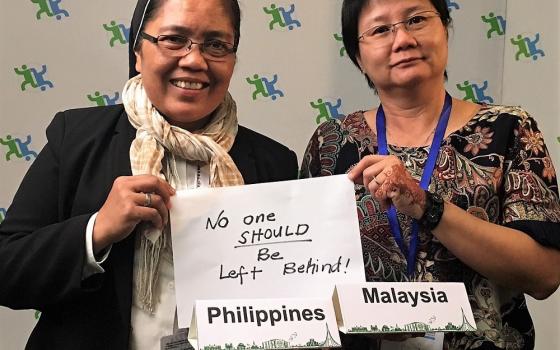A conversation with a participant of the Global Forum on Migration
While concerned about migration, Theresa Symons, Asia Pacific Regional Manager of the Mission Development Office for the Sisters of Good Shepherd, was not at all sure she wanted to attend the 2016 Global Forum on Migration (GFM). As a Malaysian, she knows her country as a "receiving" nation, with persons from across the world coming for work. When she was administrator of Good Shepherd Services in Kuala Lumpur, she oversaw the development of a shelter and program for migrants who had been trafficked for labor and/or sexual exploitation. Theresa had even submitted information and recommendations to United Nations processes on migration over the years. But when her "on the ground" expertise was tapped for contribution at a big meeting, she was not enthusiastic. She has felt that such massive meetings, costly and non-binding, did not amount to much. Still she was persuaded to reserve her doubts and, with a Good Shepherd sister from Philippines, to represent the congregation at the GFM in Dhaka, Bangladesh this past December.
The complex struggles of migrants reached a peak in 2016; at the same time, nations receiving or refusing migrants were involved in bitter debates and social crises. Global stability trembled with protracted regional wars and uneasy economic situations; political pressure toward isolationism was associated with rampant terrorism across borders. Migrants were literally left out in the cold, reviled and dying on borders that were next to what seemed to be rich utopias. Total deaths of migrants and refugees across the world, according to International Office on Migration (IOM), were listed as 7,500 in 2016.
Still, humanitarian workers, church groups and non-governmental organizations (NGOs) continued direct care services in 2016, in spite of scarce resources. International bodies such as the IOM and the U.N. pressed for mega-scale relief and solutions. Contradicting Theresa's notion that large conferences cannot change much, the U.N.-held a summit (Sept 2016) in New York addressing Large Movements of Refuges and Migrants. At the summit all U.N. member states adopted the New York Declaration for Refugees and Migrants, which promises action on a Global Compact for "safe, orderly and regular migration by 2018." This distant goal may shame us in the face of thousands of deaths, children without adults slipping across borders, nations leaving orphans in the wake of plowed-over migrant camps, and the rampant trafficking of susceptible migrants who seek only a chance for work. While the New York Declaration is considered a victory, and the GFM a step toward its realization, they are tiny steps indeed.
One complication is that international terminology distinguishes refugees as a subset of migrants; refugees are defined as people who have a credible fear of persecution in their home state. The distinction may be moot in today's political and social atmosphere. Does not extreme poverty constitute a form of persecution? Has not warfare and terrorism endangered civilian populations everywhere? The international migration office reports about one-third of the world's 65 million migrants are classified as refugees. The GFM is concerned primarily with migrants, supposedly people with skills who are moving voluntarily; it is an easier population to discuss politically. Theoretically migrants do not require the massive protections required of refugees. But, in reality, how to discuss one without the other?
With this background, imagine how inadequate Theresa might have felt as she prepared for the GFM. With the determination of a true missionary and the reservations of a seasoned social service practitioner, Theresa read all the background papers and studied the agenda. She discovered the topics were relevant and decided to focus on outcomes — what they would be and how to respond to them.
She had never been in Bangladesh, and when she arrived in Dhaka, she was stirred by the crowding and poverty of this migrant-sending country, which could not be hidden despite government restrictions on movement. Theresa knows how the economies of countries like Bangladesh rely on remittances from migrants who find work in countries such as Malaysia. Malaysia is no paradise for foreign workers, so a glimpse of the street, the sight of every person scraping for some little work, broadened Theresa's understanding of the outward push for better opportunities.
Moving into the meetings, Theresa was encouraged by the experience of diversity at a truly global conference with NGO participants from all nations. The surprising thing about such grand diversity is that she found an exceptional unity of purpose. As she described her impressions of unanimous urgent concern for migrant welfare, I could hear hope in her voice. Still her hope fluctuated, easily dimmed, as she reflected on the contrasting reality of international corruption that thwarts so much NGO work and deflates so much political will. Self-interested politics does not "peacefully coexist" with migrant welfare, working as it does out of the agendas of business and economics that are difficult to reconcile with humanitarian goals.
Pressing on, Theresa kept looking for concrete outcomes that could benefit the lives of migrants, and found some in the area of "good practices." Sometimes immediate needs are so great that service providers concentrate on basic relief and safety. But Theresa is now convinced that every program must develop education and empowerment as priorities. Education is not theoretical. It requires providers to go out to the villages from which migration takes place and engage citizens on the meaning of migration, their expectations, and the logistics of preparation for visas and job readiness, as well as teaching them how to avoid the pitfall of trafficking. Beyond these areas, there is need for greater social preparation, anticipating how migration will affect separated families, marriages, care of children; plans for coping are necessary. And stepping back from the immediate on-the-ground needs, good practice requires knowledge of international human rights tools and local laws so direct service workers are able to address holistic and systemic needs. No agency can do everything, so the last good practice Theresa addressed was the need to network and collaborate among service providers and government agencies in order to optimize different areas of expertise or specialization.
Theresa concluded the conversation with a little self-reflection, sharing thoughts about how she can now never think of "the migrant" as the "someone else." She said "Now I grasp that every person who migrates has a story, a background — just like me. My lens has changed; the world is one family, the migrant is each one of us." So, admitting that each step is slow, Theresa's experience will help our congregation to explore and hone our attitudes and practices in order to bring humanity to migration concerns in policy and in practice. Maybe we can even influence governments!
[Clare Nolan is the International Justice Training Coordinator for the Sisters of the Good Shepherd, an international woman's religious congregation that is involved in providing social services in about 70 counties, with a particular focus on women and girls in vulnerable situations.]

